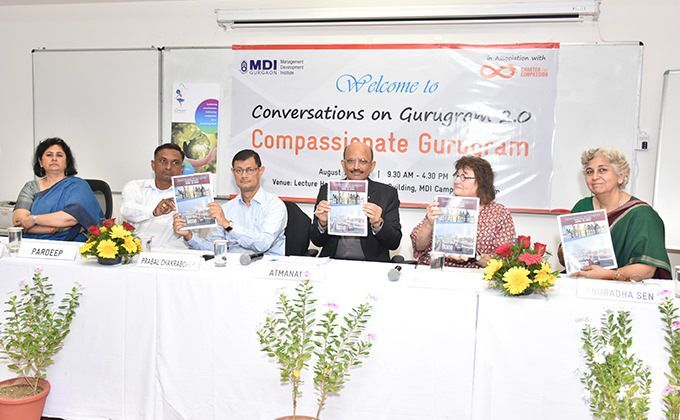MDI Gurgaon Hosts The Second Chapter Of Gurugram Conversations ’Compassionate Gurgaon’
August 20, 2019 | Business World Education
Themed ‘Compassionate Gurgaon’, the conference -- second in a series of multi-party discussions -- revolved around creating a more inclusive, empathetic as well as environmentally-sustainable ecosystem in the millennium city.
One of India’s premier and oldest management institutes MDI Gurgaon hosted the second chapter of Conversations on Gurugram on August 19, 2019, at the college campus. The conclave gathered the millennium citizenry under one roof alongside various public and private stakeholders to hold an insightful dialogue regarding current and long-standing problems being faced by the region while devising practical strategies to resolve them.
Themed ‘Compassionate Gurgaon’, the conference—second in a series of multi-party discussions—revolved around creating a more inclusive, empathetic as well as environmentally-sustainable ecosystem in the millennium city. The discourse touched upon diverse topics ranging from some of the most pressing concerns today such as water and waste management to other vital issues including work and welfare. The first chapter of Gurugram conversations – which focused on road planning and development – was held on April 12, 2019.
Through these conversations, MDI Gurgaon seeks to address critical issues stemming from the gaps in urban planning and local governance such as water management, power and sewage management, accessible healthcare, emergency response systems, and more. The goal of this project is to develop multi-stakeholder training programs, build consulting capability, trigger research projects and create a forum for policy advocacy on the back of the participation of various regional stakeholders. These include major government bodies such as MCG, HUDA and GMDA as well as private developers, farmers, original residents, and citizens who have migrated to the city in the last 20 -30 years.
Speaking on the initiative, Prof. (Dr.) Atmanand, Director (Additional Charge) MDI Gurgaon said, “A dialogue is always the first step towards solving any and all concerns that impact the society at large. We launched Conversations on Gurugram in line with this idea. Through this series of discourse, our goal is to provide a platform to the citizens, intellectuals, policy-makers, industry leaders, as well as other public and private stakeholders to come together and brainstorm to create viable solutions to some of the major social problems being faced by the people living in Gurugram. The ‘Compassionate Gurugram’ initiative looks to recognize and resolve the incumbent inadequacies in the city’s organizational and regulatory framework with the aim of establishing Gurugram as one of the most progressive, welcoming, and sustainable cities to live in.”
Following an introduction to ‘Conversations on Gurugram series’ by Rohit Prasad, Professor, MDI Gurgaon, in the first session titled ‘Compassionate City – Dream or Reality?,’ panellists shared their experience and challenges for making a city an empathetic city to live in. Inaugural address was delivered by Marilyn Turkovich, Executive Director, Global Charter for Compassion and the session was facilitated by Tanuja Sharma, Professor, MDI Gurgaon. A fish bowl discussion was conducted for capturing ‘Voices from the Ground’, on for Ws-Waste, Water, Work and Welfare, facilitated by Sunil Ashra, Professor, MDI Gurgaon. Citizens of Gurgaon shared various intiatives taken at the level of their welfare associations for managing the challenges of waste, water and working for biodiversity. Second half of the day included street play by students of DLF School, Gaziabad on Water issue, songs and presentations by MDI students. Facilitated by Prof. Madhushree Nanada Agarwal from MDI Gurgaon and Rakhee Sharma, India Lead – Education, Charter for Compassion Co-founder, Zemyna Foundation. The program eneded with ‘Call for Action’, for making Gurgaon, a better city to live in.a A special appeal was made to the students of MDI Gurgaon to volunteer for making Gurgaon a sustainable city.
The one-day event proceeded full-swing throughout the length of four sessions ending with a resolve to take actions for City-Gurgaon.
Marilyn Turkovich, Executive Director, Global Charter for Compassion said, “In order to build a compassionate society, its important to talk to each other. Compassion brings down sufferings hence its important to include all stakeholders of a city in order to build a compassionate society”.
Plight of Safai karmchari in Gurgaon was reinforced and an appeal was made to take urgent steps to improve the same. ADC, Gurgaon, Emran Raza shared the plan and problems and an intent to resolve the same.
The conference also witnessed the contributions from diffecrent stakeholders such as ADC Gurgaon, Imran, Prabal Chakraborty,ex- Vice President & Managing Director, Boston Scientific India, , Pardeep Gochchi, President, Haryana Grameen Safai Kaamchari Union, RS Rathi, Counseler, Anuradha Sen, Educationist, and citizens who have been working for betterment of Gurgaon. Some names who contributed actively are Shubhi kesharwani, Gurujal, Neelam Ahluwalia, Keshav Eco Volunteer, Garden Estate Sameera Satija Founder, Crockery Bank for Everyone Diwakar Basnet, Namita Sood, Sonia from Saahas and Sandeep Bhogra., Seema Jerath, Principal, DLF Public School, Gaziabad.
The launch of Gurugram Conversations intersects with the development trajectory of Gurgaon at an important juncture when the city is witnessing rapid progress and the urban population has hit the 1.5 million mark, as per the 2011 census. In light of these developments, the evolving infrastructural demands of this new-age population has environmental as well as social ramifications that need to be recognized and addressed at the earliest to ensure sustained growth of the city. Against such a backdrop, initiatives such as Gurugram Conversations are aiming to drive widespread social impact while better serving the long-term interests of the city on the back of concerted efforts of both the general public and influential policymakers.


